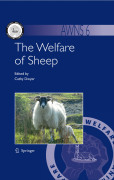
The welfare of the sheep has received less attention than the welfare of intensively husbanded animals. However, domestic sheep may be kept under conditions that are very different from the environment in which wild sheep live, with adverse effects on their behaviour and welfare. This book, written by leading researchers from Europe and Australia, takes a multidisciplinary approach to focus on the specific welfare challenges facing the sheep. The book begins witha discussion of current welfare thinking and how this might be relevant to sheep husbandry. The adaptations of wild sheep to diverse environments, and how their behaviour and physiology has developed to deal with these conditions is described and compared to conditions in modern sheep husbandry. The varied welfare demands of disease, nutrition and metabolism, farming systems and management practices are then discussed by specialists in those areas. Only text specifically to consider the welfare of the sheep Detailed descriptions of the behavioural, physical and physiological adaptations of the sheep Considers the welfare of the sheep from a multidisciplinary perspective, including health, behaviour, management and economics Places sheep welfare in a future context INDICE: Series Preface. Preface. List of Contributors. 1. Introduction to animal welfare and the sheep. 2. Environment and the sheep: Breed adaptations and welfare implications. 3. Behaviour and the welfare of the sheep. 4. Sheep senses, cognition and capacity for consciousness. 5. The impact of disease anddisease prevention on welfare in sheep. 6. Farming systems for sheep production and their effect on welfare. 7. Nutrition and the welfare of sheep. 8. The management of sheep. 9. The economics of sheep welfare. 10. Sheep welfare: A future perspective. Index.
- ISBN: 978-1-4020-8552-9
- Editorial: Springer
- Encuadernacion: Cartoné
- Páginas: 380
- Fecha Publicación: 01/10/2008
- Nº Volúmenes: 1
- Idioma: Inglés
